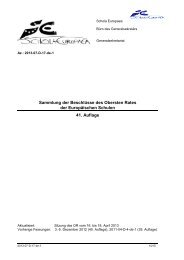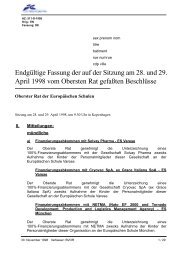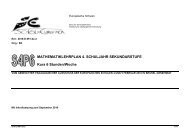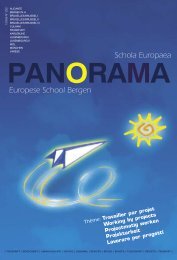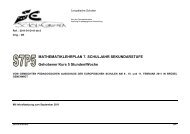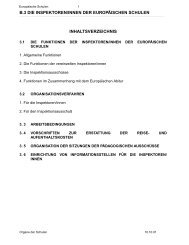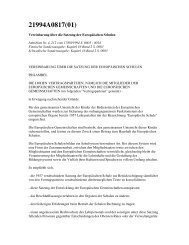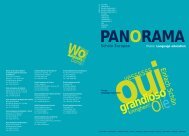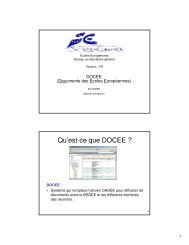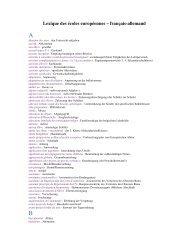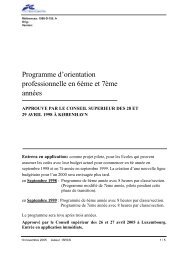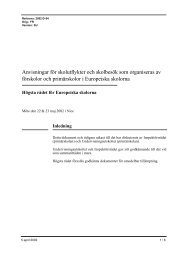External Evaluation of the European Baccalaureate (Annexes)
External Evaluation of the European Baccalaureate (Annexes)
External Evaluation of the European Baccalaureate (Annexes)
You also want an ePaper? Increase the reach of your titles
YUMPU automatically turns print PDFs into web optimized ePapers that Google loves.
The curriculum is written up as a list <strong>of</strong> chapter headlines and a short text that may appear as<br />
an abstract, in 4 lines, <strong>of</strong> <strong>the</strong> content <strong>of</strong> each chapter.<br />
1.3 1.3. Comparison:<br />
EB: more attention specifically paid to geographical methods and tools, in 6 th form;<br />
Comment: <strong>the</strong>se topics are studied in France in <strong>the</strong> previous year (“seconde”);<br />
EB: global geography studied in <strong>the</strong> 6 th year in a non –systematic approach: 2 <strong>the</strong>mes chosen<br />
among more than 15. Students can sit for <strong>the</strong> bac having only studied 2 very limited topics<br />
(ex: <strong>the</strong> Watt, taken from <strong>the</strong> <strong>the</strong>me “protected zones”; Cyprus, from <strong>the</strong> <strong>the</strong>me “borders”)<br />
EB: development deeply studied for itself as a <strong>the</strong>oretical question<br />
In 6 th year, EB curriculum provides much less comprehensive coverage <strong>of</strong> <strong>the</strong> subject domain<br />
and adopts a more <strong>the</strong>oretical approach about <strong>the</strong> topics that are studied in France in <strong>the</strong> last<br />
year (global geography and development).<br />
EB: a strong accent on Europe. In <strong>the</strong> 7th year, but studied as old nations are generally<br />
studied in textbooks: physical geography, climate, vegetation, population, resources, etc.<br />
This is obviously an interesting perspective, but it seems:<br />
- ra<strong>the</strong>r artificial, and “voluntarist”; a heavily idealised Europe? For example, states are not<br />
mentioned;<br />
- partial, as Europe is not seen as a political puzzle <strong>of</strong> states and no specific <strong>European</strong><br />
country is approached for itself (only sub-regional aspects).<br />
EB: still very abstract perspective, with a lot <strong>of</strong> models and <strong>the</strong>ories.<br />
France: very few <strong>the</strong>oretical references;<br />
France: an <strong>of</strong>ficial description <strong>of</strong> <strong>the</strong> world that leaves little room for teacher’s interpretation.<br />
This is just a curricular approach, that we are going to complete by an assessment approach,<br />
but:<br />
- as to <strong>the</strong>ory, we can expect EB laureates to be well trained (but we would like to check if<br />
<strong>the</strong>ory is not for <strong>the</strong>m too… <strong>the</strong>oretical…);<br />
- as to <strong>the</strong> content, <strong>the</strong> impression is <strong>of</strong> an ideological more than <strong>of</strong> a scientific approach <strong>of</strong><br />
Europe , and <strong>of</strong> a severe gap as to knowledge about <strong>the</strong> world, due to both too flexible<br />
approach <strong>of</strong> content in 6 th year and too abstract an approach to ways <strong>of</strong> presenting reality.<br />
1.4<br />
2. 2. The test itself<br />
2.1 2.1. Within <strong>the</strong> French bac:<br />
2.1.1. In general<br />
The type <strong>of</strong> test is <strong>the</strong> same in <strong>the</strong> three academic channels, <strong>the</strong> difference for students <strong>of</strong> ES<br />
série being principally a difference in weighting factors (<strong>the</strong> “S” students have a specific QP<br />
but conform to <strong>the</strong> overall definition).<br />
According to <strong>of</strong>ficial texts (common to Geography and History), three objectives for this test:<br />
1. To assess candidates’ abilities to mobilize <strong>the</strong> notions and concepts <strong>of</strong> <strong>the</strong> curriculum,<br />
that are necessary for understanding contemporary world, and for civic and cultural<br />
citizen’s aptitude.<br />
2. to assess acquired competences in processing and organizing historical and<br />
geographical data in a hierarchy, and in reasoning from a historical or a geographical<br />
point <strong>of</strong> view;<br />
3. to assess <strong>the</strong> ability <strong>of</strong> <strong>the</strong> candidate in writing and mastering argumentation.<br />
128



